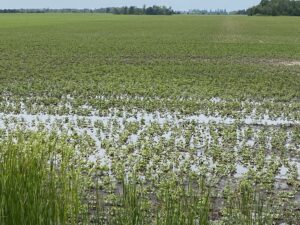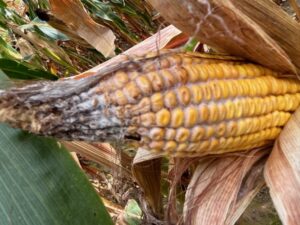Peter Sikkema retires
INTO THE WEEDS FOR MORE THAN 30 YEARS

EVEN AFTER THREE DECADES OF RESEARCHING WEEDS AND HOW TO CONTROL THEM, Dr. Peter Sikkema is still amazed by the science.
“I’m turning 66, and never have I been more fascinated by the intersection between biology and chemistry than I am today,” says the former professor of weed management at the University of Guelph’s Ridgetown Campus. “I’ve spent my career in this area, and it is incredible how subtle differences in chemistry affect crop tolerance, the spectrum of weeds controlled, and herbicide carry over from one year to the next.” Sikkema retired from the university on January 31, 2024.
He has witnessed the evolution of the weeds that plague Ontario grain crops and has been instrumental in helping farmers manage weeds and increase yields along with their bottom lines.
“My role was to develop weed management solutions for affected farmers,” he says of his research. “It’s a pretty nice way to live — getting paid as a university faculty member to help Ontario farmers do a bit better job of managing weeds and help students learn about weed science.”
THE EARLY YEARS
Sikkema was raised on a dairy and hog farm in Wellington County near Guelph. After completing high school, he received his bachelor’s degree in 1981 and master’s in weed science in 1983 from the University of Guelph.
“It was serendipity,” he says of his entry into weed research. After his third year of university, he worked as a summer student for the Ministry of Agriculture and Food under the direction of Harvey Wright, the soil and crops specialist for Oxford-Brant. “I did my first experiment with triazine- resistant pigweed on a farm in Brant County,” he says. Wright recommended Sikkema to Dr. Jack Decker at the University of Guelph as a good candidate for graduate work. From there, his career path was set.
After working in the private sector for six years, Sikkema accepted a position at Ridgetown College in 1988 and became a University of Guelph employee when the college became part of the institution in 1997. He completed his PhD part-time at the University of Western Ontario between 1996 and 2002.
WATERSHED MOMENTS
After taking over the weed management program in 1993, Sikkema witnessed several big changes.
“The introduction of Group 2 herbicides, which could be applied post-emergent in corn for grass control, was a leap forward,” he says. “Prior to that, there were only soil- applied herbicides, and if you didn’t have a rain-activating event, you’d have grass in the corn for the rest of the season,” he says.
While there were several more improvements to herbicides, the biggest change was the registration of Roundup Ready soybeans in Ontario in 1997 and corn in 2001. Glyphosate is the active ingredient in the Roundup herbicide, and Roundup Ready crops are resistant to glyphosate.
Throughout his career, Sikkema’s group conducted over 4,000 experiments at the Huron Research Station, Ridgetown Campus, and on hundreds of farms.
“I’d like to thank all the farm co-operators who allowed us to do research on their farms over the years,” he says. “Without them, we wouldn’t have been able to develop weed management solutions for species that are not present on the research stations.”
TEACHING AND MENTORING
“I thoroughly enjoyed being in the classroom,” he says. While he used a textbook in 1994 to teach his first course, he soon stopped because, most of the time, the content was outdated.
“For the last 25 years, I did not use a textbook because weed science moves forward so quickly,” he says.
Mentoring graduate students was a ‘real privilege’; the 40 young people he guided were academically gifted, extremely hard-working, and pleasant to interact with. “Graduate students worked on weed management issues for which I didn’t have the answer, so I learned alongside and from these brilliant young people,” he says.
All of them made significant contributions to Ontario farmers. Sikkema cites Joe Vink, who researched glyphosate-resistant giant ragweed. Before his research, the main herbicide program was Roundup plus Eragon plus Merge, which provided about 70 per cent weed control. Vink discovered that applying $5 worth of 2,4-D before planting soybeans increased weed control to 95 per cent.
“Within a year or two of Joe completing his M.Sc. research, almost the entire industry switched based on his work on controlling glyphosate-resistant ragweed,” he says, adding that there are many more graduate students whose research results have similarly benefited farmers.
LOOKING FORWARD
“Weed management in the future will be far more reliant on diversified, sustainable programs,” he says.
He foresees more farmers using combinations of cultural (e.g. rotating crops, narrowing row widths, planting cover crops), biological, mechanical, and chemical weed control techniques.
On the mechanical side, there is a harvest weed seed control where grinders pummel the weed seeds, so they’re no longer viable before leaving the combine. There are also flamers, robots, and lasers.
He sees a number of new techniques emerging to manage weeds on farms, including more ‘see and spray’ precision application technology, which has the added advantage of reducing the environmental loading of herbicides.“I think herbicides will continue to be one component of a diversified weed management program,” he says.
Sikkema says that the approach to weed management needs to be re-evaluated, particularly in light of weeds like waterhemp, which has evolved resistance to five herbicide modes of action in Ontario. In the ten years since its presence was first documented in Ontario, glyphosate-resistant waterhemp has been found across southern Ontario.
“If a farmer finds waterhemp in the field, the strategy needs to be near-perfect weed control and zero weed seed return to the soil,” he says, contrasting this with strategies from 30 years ago when getting perfection would be seen as spending too much money on weed management. In those days, economic cost-benefit analyses could lead farmers to choose not to control certain weed species when they were present at low densities.
He is convinced that weeds will continue to evolve resistance to more herbicide modes of action over time. That’s why he recommends farmers work on diversified weed management programs that use multiple herbicide modes of action over several seasons in a corn, soybean, and wheat rotation and incorporate mechanical, biological, and cultural techniques.
In terms of the effects of climate change on weed management, Sikkema cites a United States Department of Agriculture study which showed that current herbicides are degraded more rapidly in the soil because of increased soil temperatures and heavy rain events, shortening the amount of time that herbicides provide residual weed control. “I think that you could have shifts in weed species composition over decades rather than years in response to climate change,” he says. “Things continue to change all the time – just look at the current problems with multiple herbicide-resistant waterhemp.”
Sikkema says that while he will be slowing down in his retirement, he will continue to ‘dabble’ in weed research and would like to continue providing the latest information on weed management to Ontario farmers. •












